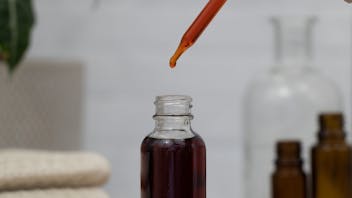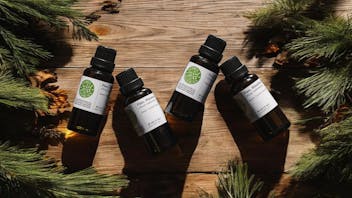Product Overview
Fenugreek CO2 total extract is a rarely seen, hard-to-find, specialty aromatic vegetal oil quite different from the more rare steam-distilled Fenugreek essential oil. It has a fresh, sweet, calming aroma that is diffusive, warm, and powdery, with soft spicy-nutty-earthy undertones and a maple syrup and licorice-like sweetness; the soft, sweet-spicy, nutty notes are very tenacious. With its primary constituents being Linoleic, Linolenic and Oleic polyunsaturated fatty acids - along with aromatic volatiles such as Neryl acetate, Camphor, Beta-Pinene - it offers both valuable aromatic and skincare properties. Fenugreek CO2 is sometimes used in perfumery in extremely minute amounts.
Native to the Eastern Mediterranean area and Southeast Asia, the largest producer of Trigonella foenum-graecum is India.[1] Historically, Fenugreek was grown as fodder for livestock according to Cato the Elder, as stated in his book De Agri Cultura (On Agriculture), published ca. 160 BCE.[2] Fenugreek has a tremendous amount of historical use across many cultures, including the ancient Egyptians, Greeks, and Romans,[3] a tradition that continues to this day.
While Fenugreek CO2 has a distinctive aroma, many of the aromatic components are virtually undetectable by normal analytical methods, yet they still contribute to the unusual scent. The lower temperatures required for supercritical CO2 extraction provide an edge over steam distilled Fenugreek seeds – the presence of the primary constituents linoleic, linolenic (about 8 times higher than that of virgin olive oil) and oleic polyunsaturated fatty acids – making possible a truly valuable and complete oil for aromatherapy purposes.[4]
In low proportions Fenugreek CO2 may add a sweet, burnt sugar aroma to skincare and perfume blends. “Traces of Fenugreek extract can ruin a perfume…if used in the wrong combination; but equally minute concentrations of Fenugreek extract can do wonders in certain compositions: …[Amber] bases, aldehydic-herbaceous topnotes, chypres, fougères, lavender compositions, new mown hay bases, etc.”[5]
1 Parthasarathy, V.A., K. Kandinnan and V. Srinivasan (ed.). "Fenugreek" in Organic Spices, New India Publishing Agencies, 2008, p. 694.
2 Cato, Marcus. De Agri Cultura (On Agriculture), ca. 160 BCE.
3 Grieve, Mrs. M. A Modern Herbal, Vol. 1, 1971, p. 299.
4 Industry communication.
5 Arctander, Steffen. Perfume and Flavor Materials of Natural Origin, 1960, p. 243.



